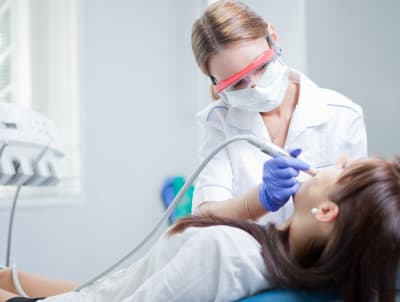Dental assistants are members of a dental team whose job is to support a dental operator by performing tasks such as making patients comfortable in their chairs, sterilizing dental instruments, instructing patients on proper dental hygiene, and so on.
According to the Bureau of Labor Statistics, dental assisting is one of the fastest-growing fields in healthcare support. Part of the reason for this is the fact that it is relatively quick to get started as a dental assistant.
If you’re interested in pursuing a career in this field, we have prepared a detailed overview below regarding the most important things you must know about being a dental assistant.
Introduction to Dental Assisting
Dental assistants almost always work in a dentist’s office. Here, they perform a series of duties ranging from administrative to clinical. These include but are not limited to the following:
- Making sure that the patient is ready for treatment
- Making sure that the work area is prepared for the procedure
- Making sure that patients are sited comfortably in their chairs
- Ensuring that dental instruments are sterilized before a procedure
- Handing the dentist appropriate tools during a procedure
- Teaching patients about proper oral hygiene
- Completing lab tasks as instructed by the dentist
- Processing x-rays
- Scheduling appointments
- Coordinating billing and payment
- Keeping a record of dental treatments
Additional Duties
It should also be mentioned that dental assistants are allowed to take on more technical duties, depending on the office where they work and the state’s rules.
These tasks include:
- Coronal polishing - the removal of soft deposits such as tartar and plaques to give the teeth a smoother, cleaner appearance
- Fluoride application - A process wherein fluoride is applied directly on the teeth, often to prevent cavities.
- Topical anesthetic application - applying a specific anesthetic to an area of the teeth. Like any anesthetic, this is used to numb the area so the patient cannot feel pain during the procedure.
- Sealant application - Sealants are applied to block out food particles and bacteria. They are also used to stop the development of cavities.
All of these are advanced technical tasks that a dentist may instruct a dental assistant to perform, but only in certain states where there are no limitations regarding these functions.
Other advanced duties include fitting crowns and orthodontic brackets, taking and developing radiographs, and removing sutures.
Work Environment
Dental assistants are found overwhelmingly in a dentist’s office. According to the Bureau of Labor Statistics, 91% of dental assistants work in dentists’ offices. Only 2% work in government offices, and another 2% in physicians’ offices.
Dental assistants must be comfortable working with others, as they will be working with dentists, dental hygienists, and other dental auxiliaries.
Lastly, they must also be comfortable wearing safety glasses, surgical masks, protective clothes, and gloves. All of these are needed to protect themselves and the patients from infections.
Starting a Career as a Dental Assistant
There is more than one way to become a dental assistant. While certain states have laws restricting these alternatives, most states allow dental assistants to practice as long as they fulfill the following criteria.
Obtain Formal Education
The most popular approach to becoming a dental assistant is obtaining a formal degree. Now, getting a degree to practice as a dental assistant also has two different directions.
The first is to obtain a certificate/diploma, while the second is to obtain an associate degree. Both will get you started and put you on a path to becoming certified, but there is still a significant difference between them.
While certificate and diploma programs require a high school diploma or GED and are completed within nine months of study, associate degrees have stricter requirements, including college preparatory courses, a minimum GPA, and sometimes SAT. The latter also takes longer to complete.
Enrolling in programs accredited by the Commission on Dental Accreditation (CODA) is advisable as it usually leads to an easier path toward certification and all the perks that come with it.
Go Through a Dental Assistant Training
It is also possible to become a dental assistant without going through formal education. This is done by acquiring on-the-job training wherein you learn while working in a dentist or physician’s office.
Dental assistants who got into the profession through on-the-job training can also get certified. However, they must acquire two years of full-time experience before qualifying for the certification exam.
Skills Requirement
Apart from educational requirements, there are also specific skills a dental assistant is expected to have. These include:
- Attention to Detail - A dental assistant must be detail-oriented. They are expected to follow specific rules and protocols and must understand every important detail of that protocol. They must also be aware of the duties they are allowed to perform and those they aren’t allowed to in the state where they practice.
- Dexterity - Dental assistants must be good with their hands. They are expected to work in tight spaces and must be able to maneuver their body dexterously to handle precise instruments in these spaces.
- Interpersonal Skills - Not only do dental assistants work with dentists and patients, but they are also in constant contact with dental hygienists and other personnel. For this reason, they are expected to have good interpersonal skills.
- Organizational Skills - A dental assistant performs many tasks requiring strong organizational skills. Not only must they organize tools and instruments in a way that makes them easily retrievable, but they must also organize tasks, schedules, and records similarly.
- Listening Skills - Lastly, a dental assistant is expected to listen to others well. As mentioned earlier, they will have to work with doctors who will have significant instructions for them every day, patients who will have questions and complaints, and other personnel with whom they must work closely to ensure the smooth and effective day-to-day running of the office.




